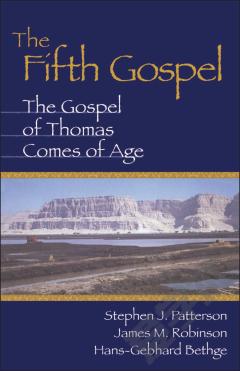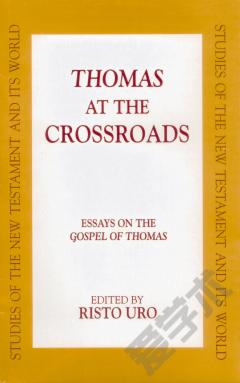The Fifth Gospel —— The Gospel of Thomas Comes of Age
----- 第五福音:托马斯福音时代的到来
The Fifth Gospel: The Gospel of Thomas Comes of Age, by Stephen J. Patterson and James M. Robinson, with a New English Translation by Hans-Gebhard Bethge et al. Berliner Arbeitskreis fur koptische-gnostische Schriften. Harrisburg, PA; Trinity Press International, 1998. Pp.119. N.P. I hardly thought there was need for a new translation of the Gospel of Thomas until I read this one. The Gospel of Thomas was one of the first treatises of the Nag Hammadi Library to be published in translation, and several good translations already exist (by Robert McL. Wilson, Marvin Meyer, and the standard critical translation by Thomas O. Lambdin, among others). But this translation by the Berlin Working Group for Coptic Gnostic Writings (Berliner Arbeitskreis fur koptische-gnostische Schriften) under the leadership first of Hans-Martin Schenke and now of Hans-Gebhard Bethge, advances the grace and ease of translation more than any previous one. This English translation was prepared by the Berlin Working Group for inclusion in Kurt Aland's Synopsis Quattuor Evangeliorum (15th ed.) and is here presented in a further revised form. The translation tends toward demystifying the sayings and rendering them in a more accessible "wisdom" language. Take, for example, the Introduction and the first saying, which are combined in the translation: "These are the hidden words that the living Jesus spoke. And Didymos Judas Thomas wrote them down. And he said: `Whoever finds the meaning of these words will not taste death."' Compared to Lambdin's translation (Nag Hammadi Library in English, ed. James M. Robinson), the "secret sayings" have become simply "hidden words," while the "interpretation of these sayings" has become more straightforwardly to "find the meaning of these words." Effectively this translation strategy aligns these sayings of Jesus with the larger corpus of gnomic literature as opposed to the more mystifying language that aligns them with the opaque language of Gnosticism. This translation strategy is evident in other sayings as wellsayings 2 ("be dismayed" as opposed to "being troubled") and 8 ("sensible fisherman" as opposed to "wise") among many others. This translation also distinguishes itself by clarifying some of the more obscure and difficult readings of the Gospel of Thomas. Although scholars may disagree with certain readings, the general public will find them accessible. Two examples will illustrate this. First, Gos. Thorn. 27 renders the literal "If you do not fast against the world" of the Coptic as "If you do not abstain from the world, you will not find the kingdom." The Berlin Group's translation goes directly to the meaning of the language rather than reproducing the Coptic literally into English. The second example is Gos. Thorn. 49, where the Coptic has been read more simply. The Berlin Group renders the saying as "Blessed are the solitary ones, the elect. For you will find the kingdom." Lambdin's translation"Blessed are the solitary and elect"-implies that there are two groups, not one, that are blessed. â¦
{{comment.content}}








 京公网安备 11010802027623号
京公网安备 11010802027623号